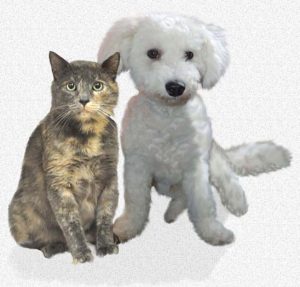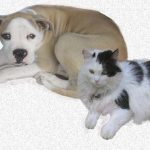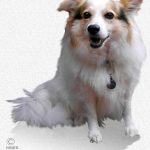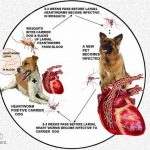Ron Hines DVM PhD
Pets cough for so many different reasons. Some of of the reasons are very minor but some of them are quite serious. It could be that your pet just drank its water a bit too fast – or it could be the first sign of a serious problem involving its heart or lungs. Here are some of the more common causes. But some pets cough for less common reasons that are not mentioned in the article.
How Does A Veterinarian Decide Why My Pet Has A Cough?
When veterinarians question owners about their pet’s cough they usually begin the interview with the same set of questions every time: Is your pet a cat or a dog? That brings a certain set of common causes to mind. When it is a cat, the common causes are somewhat different. Is it a small breed of dog – less than 15 pounds or is it larger? How long has the cough been going on? How old is your pet? Is the cough harsh and dry or is it moist and productive? Does your pet cough more when it is up and active or when it is lying down? Is your pet listless or more depressed than usual? Is it having trouble breathing or breathing rapidly? Does the problem occur during a particular season every year or in particular situations? Does your pet sneeze too? Does it have a runny nose? Was the pet been boarded or groomed recently? Has your pet gained or lost weight? Are there any other changes you have noticed in your pet?
Those sort of questions give your veterinarian a basis to begin an examination. I usually begin an exam by looking at the pet as it walks around the exam room. It is amazing how much a dog or cat will tell you through its mannerisms – if you just observe them closely.
The pet’s mouth is a good place to begin. Check to see if its gums are pale or bluish or if blood vesicles in the gums stand out (injected gums). Injected gums can be associated with heart disease.
Check the pet’s tonsils. Enlarged tonsils often cause a cough. That is also a good time to check that the pet has nothing lodged in its throat. Look for inflamed eyes or a crusty nose. When an irritated trachea (windpipe) is part or all of the problem, massaging the pet’s neck will often cause a cough.
Check the pet’s neck to see if an abnormal pulse is present in the jugular vein and feel the pet’s abdomen to detect fluids or an enlarged liver or spleen.
A stethoscope, listening to the pet’s heart and lungs sounds, is the first step in detecting problems there. Lung sounds that are dry and harsh often accompany upper respiratory tract infections. Moist congested lung sounds can indicate pneumonia or lung congestion due to heart disease. Both these conditions cause coughing. Then some x-rays if indicated.
Check to see if any of the pet’s superficial lymph nodes and take the pet’s temperature.
These are some of the common causes of cough in dogs and cats. The list is not complete – but it covers most of the cases that come my way:
Breed Characteristic:
Dogs and cats with flat faces that snore, often have elongated soft pallets in the rear of their mouths. This can cause coughing. Pekingese, Pugs, Bulldogs, Lhasa Apsos, Shih-Tzu and some Persian-type cats fall into this category. When serious flare-ups occur in these pets, I put these pets on a short course of corticosteroid and antibiotic treatment. Occasionally, the problem is so severe that the pet does not get enough air. When this is the case, I can surgically remove a portion of the soft palate. This is very exacting surgery and must be performed cautiously. If too much tissue is removed or scarring occurs, the coughing will become worse, and the pet will breathe food and water into its lungs.
Tonsillitis:
Tonsil infections are passed from pet to pet through close contact, coughing, sneezing and through contaminated food, water bowls and other objects. It is most common in toy breeds of dogs and puppies. Tonsillitis rarely causes coughing in cats. The two tonsils normally lie in deep crypts or crevices at the far back of the mouth.
With certain infections such as kennel cough, the tonsils enlarge, partially obstructing the pet’s throat. Usually, both tonsils are affected. When enlarged tonsils become inflamed and ulcerated the pet will spend hours trying to cough them up. This is a retching, violent cough that usually ends in a gag, producing foam. These pets will sometimes paw at their mouths. I treat many of these animals with a two-week course of antibiotics. My favorite antibiotic for this problem is trimethoprim/sulfa. If the tonsillitis returns frequently, I remove the tonsils. Many toy breeds have large tonsils, but removing them rarely prevents coughing. In these breeds, it is usually a narrow trachea that is the root of the problem.
Hairballs In Cats:
Long-haired cats that are infrequently groomed will periodically retch, cough and vomit up mats of hair. Brushing the cat frequently, cutting its hair or weekly administration of a flavored petrolatum-based hairball remedy usually solves this problem. Hairball cat food, high in fiber, also solve this problem.
Tooth And Mouth Infections:
Small breeds of dogs, especially Toy poodles, Yorkshire terriers, Maltese and Pomeranians are very subject to gum disease, loose infected teeth and mouth inflammation. This is partly due to their genetics but also due to feeding them soft table foods. These oral infections sometimes inflame the rear of the throat causing coughing. Often the problem is magnified by a flabby, narrow trachea or windpipe as well as tonsillitis due to the mouth infection. This is a quite serious problem because the infection often migrates to the valves of the heart (mitral valve) damaging the heart as well.
These pets need to have all diseased teeth removed. This is not major surgery in these pets because the teeth are already loose and no longer used in eating. , Many vets place these pets on two or three weeks of antibiotics, and try to get the owners to feed them balanced dog foods. Changing a pet’s eating habits is not easy.
Kennel Cough
Kennel cough in dogs, is also called infectious tracheobronchitis. It is actually a group of diseases cause by the bacteria, Bordetella bronchiseptica as well as many respiratory tract virus. The signs of bordetella, parainfluenza virus and Canine Adeno-2 virus and respiratory coronavirus are identical and often the two or three organisms work in tandem along with mycoplasma to cause the cough.
To get this problem, your dog must have had contact with a sick or recovering pet. Soft dry coughs and sneezing are the two most common signs. They begin 2-7 days after the dog was exposed. Some dogs with this problem only cough when they are excited. Kennel cough is highly contagious and passes directly from dog to dog at kennels, grooming parlors, pet stores, doggy parks and humane societies.
Dogs with this disease rarely act ill, although they may vomit food and foam due to enlarged tonsils and tracheal irritation. In healthy dogs, the cough can last seven days to three weeks. But it can persist much longer in flat-faced breeds or dogs with narrow tracheas (their windpipe).
I have never seen a case of kennel cough that endangered an otherwise healthy pet’s life. But if a dog is seriously ill in other ways, kennel cough can push it over the edge. It can also be life-threatening or linger in flat-faced breeds that have trouble breathing. It is not clear that antibiotics will always make your pet get well any faster. But most vets place many dogs on antibiotics for a week or two.
If the cough is not too severe, many vets dispense a guaifenesin-based cough syrup. If guaifenesin is not enough to control the cough, there are stronger narcotic cough suppressants such as butorphanol for dogs (Torbutrol®). Humidifiers help clear mucous from the throat allowing the dog to breathe easier.
Pets that are frequently exposed to other pets and that have a tendency to cough might need a kennel cough vaccination every year. Show dogs may need it more frequently. The intranasal vaccine is more effective than injectable products. Vaccinating a dog the day it goes to the kennel is valueless – it takes a good week to ten days for the vaccine to protect your pet.
Kennel Cough vaccines come in two forms: One that is given by injection and one that is given as drops placed in your pet’s nose (Intra-Trac 3®, Bronchi-Shield III® etc.). In my opinion, the injectable vaccine is of little or no value. (read here) If the intranasal vaccine is accidentally given to your pet by injection, the result can be a very severe reaction. Some vets still use the injectable product because it frees them from this concern. Read more about kennel cough here.
Rhinotracheitis (Herpes-1) In Cats:
Cats with coughing due to this problem usually originated recently from humane societies, shelters and catteries. Although most cats with this disease sneeze and have watery eyes, some cases of rhinotracheitis develop a cough. You will find a more extensive description of this problem and how I treat it under the articles entitled “Why Is My Cat Sneezing” and “Upper Respiratory Infections In Your Cat”. When cats with this infection cough, it is usually due to secondary bacterial infections that accompany the virus. The same bordetella bacteria that causes kennel cough in dogs will cause this condition in virus-weakened cats. I treat these cats with antibiotics, multivitamin drops, non-narcotic cough suppressants and good nursing care.
The amino acid, lysine, has been found to help many cases of rhinotracheitis resolve. This amino acid reduces the amount of another amino acid, arginine, that is present in the cat’s body. Arginine is thought to be necessary for herpesvirus to reproduce. The suggested lysine dose is 250-500 mg per day sprinkled on canned cat food. I would give this supplement until the acute flare-up has resolved. But many cat owners continue the supplement indefinitely. Lysine can be purchased at health food stores. Pick a brand that is propylene glycol-free. Read more about rhinotracheitis/herpes1/cat flu here.
For this problem, you can also read articles here, here, here, here and here.
Collapsing Trachea:
Toy breeds of dogs are very prone to a genetic abnormality called tracheal collapse. I believe I have seen this problem in more Pomeranians than any other breed. The trachea is made up of cartilaginous rings in the shape of a sideways “C” with the open space to the top. In collapsing trachea the inner soft portion of the windpipe is sucked into the airway during inspiration – partially blocking it. With time, the lining becomes inflamed, causing a chronic dry, hacking cough. You can diagnose this condition by massaging the trachea near the dog’s chest for a minute or two. Dogs with this problem go into a coughing spell as soon as you finish the massage. But your veterinarian should check to be sure other serious problems are not also involved.
When the problem flares up, many vets place these dogs on a cough suppressant and an anti-inflammatory drug such as prednisone until the problem resolves. It is never wise to give pets prednisone or other steroids for long periods of time if it can be avoided. Air humidifiers are also helpful. These dogs often do better wearing harnesses rather than collars with their exercise limited until their cough is better. Various surgical techniques are used to attempt to cure this condition. They meet with mixed success.
Migrating Hook And Roundworm Larva:
Dog and cat hookworms and roundworms can also cause a cough. Veterinary and medical doctors call this a verminous cough. This problem is primarily a concern in young dogs, kittens and puppies coming from unsanitary conditions. When a dog or cat accidentally eats a hookworm or roundworm larva or egg, the larva burrows through the pet’s stomach or intestine into its blood stream. When it reaches the lungs it is coughed up, re-swallowed and then matures in the pet’s intestine. If the pet becomes infested with large numbers of larva due to an environment contaminated with feces, the owners will notice the cough. Children in that type of environment are also at risk of serious eye infections.
Preventing verminous coughs is a mater of sanitation. Dog feces need to be collected and disposed of properly. Hookworm larva thrive in damp shaded soil. One of the best ways to prevent this problem is to keep all your pets on a monthly heartworm medication that is formulated to kill these parasites as well.
Allergies And Irritants:
Some dogs and cats, like people, experience throat and nasal irritation due to chemicals in perfumes, cigarette smoke, new bedding, carpeting, etc. Dust mite allergy is said to occasionally cause coughing in pets. This is an uncommon primary cause for coughing in pets. Coughing can be a multi-faceted problem, and it is quite likely that allergies and irritants have made many of the cases of cough that I do see, worse. Read more about allergies in pets here.
Heartworm Disease:
Heartworms are transmitted to dogs and cats by mosquitoes. The disease is common in dogs and rarer in cats. Mosquitoes that bites an infected dog, ingests microscopic heartworm larva or microfilaria. When they next bite a dog or cat these larva migrate through the new host’s body and lodge in the upper-right side of the heart. Depending on the number of heartworms present and the length of time they are there, the heart is slowly damaged and enlarges. The presence of heartworms also causes inflammatory changes in the lungs. In dogs, these changes, along with pressure from the enlarged heart on the windpipe cause a dry to moderately moist cough. In cats the signs are more similar to feline asthma. By the time a cough is present the disease is quite advanced and some of the changes to the heart and lungs are irreversible. Dogs with heartworm coughs are noticeably ill. They are thin over their back and their hair coat is dry and musty. They have a worn-out look about them and are often prematurely gray around their mussel and toes. If the disease is advanced, they are pot-bellied due to an enlarged liver and excess fluid in their abdomens. They will usually be positive on a heartworm antigen test. Their cough is worse when they lie down. These are pet’s that did not receive monthly heartworm preventative.
After assessing the degree of damage to the body, veterinarians treat most of these dogs with Immiticide®/Diroban®, an arsenic-containing medication that kills the adult parasites. The “three-shot” technique is safest for your pet. If the disease has caused marked damage to the liver and heart veterinarians often try to stabilize and improve the pet’s health before beginning these injections. If that cannot be done, there are other alternatives. Read about heartworm treatment in detail here. Although heartworm treatment eliminates all or most of the worms, it will not repair the damage already done to your pet’s heart. Read more about heartworm disease in dogs here. In cats here.
Congestive Heart Disease
Coughing is one of the most consistent signs of heart disease. The most common form of heart disease in dogs and cats begins with damage to the mitral valve on the left side of the heart. When I listen to the heart with my stethoscope, I can detect abnormal sounds on the left upper quadrant of the heart – the area where this valve is located. X-rays and ultrasonography of the pet’s heart show a typical rounded, enlarged heart shape with the trachea. Pressure on the trachea pushed abnormally high. Fluid will also be seen in the pet’s lungs. This fluid and pressure on the trachea are the primary causes of the cough. The pets’ gums are often bluish-gray (cyanotic) and slow to return to normal color when my fingers pinch them. The livers of these pets are enlarged with pooled blood, and they may have fluid in their abdomens. Mitral valve insufficiency is the most common heart disease in older dogs. It affects over one-third of the dogs that are older than ten.
Early in this condition, placing the pet on the diuretic, furosemide, eliminates the cough and improves the function of a weakened heart. These dogs and cats do well when placed on a sodium-restricted diet. As the disease progresses, your pet will need other medications. One of the most effective medications is the ACE inhibitor, enalapril maleate. Read some other more detailed article on the subject here, here & here
Dilated Cardiomyopathy
Cardiomyopathy is a form of heart disease that affects larger breeds of dogs. Doberman Pinchers and boxers have a high incidence of this condition. In cats, it has long been associated with a lack of dietary taurine. It is very rare in dogs that weigh less than 30 pounds, and it is rare for it to be associated with a taurine deficiency in dogs. The onset of this disease is very rapid. Pets begin to cough and show general weakness and exercise intolerance all within a matter of weeks. When I listen to the chests of these dogs, their heart rate is very fast and weak. Often the heartbeat is very irregular. X-rays and ultrasound images of these pet’s chest show a huge heart – often with an enlarged left upper chamber (atrium) and the lungs filled with fluid. Read about this problem in detail here.
Lungs Tumors:
Hacking coughs in old dogs and cats are also common when tumors are present in their lungs. These are always sad cases to deal with. When lung tumors are advance, pets may cough up blood as well as phlegm. Primary lung tumors are very rare in cats and dogs. These are generally secondary tumors that have moved to the lungs from another location.
Sometimes, if the disease is advanced, abnormal lung sounds or silent areas are present. But it is X-rays that are needed to identify the problem. Often the pet’s lungs show a shower of small tumors throughout the lung fields. The most common tumor type is adenocarcinoma. Although many vets refer these pets on to a veterinary oncologist, there is really no effective chemotherapy for dog or cats that I feel is worth the suffering they will experience in chemotherapy or the short extension of their lives that it might bring. Try to make their remaining life as pleasant as possible with cough suppressants, steroids and bronchodilators such as theophylline and lots of Love. Do not prolong their lives beyond their happiness.
Laryngeal Paralysis:
This is a relatively rare condition in which the structures of the throat (larynx) become paralyzed allowing food and water to enter the lungs causing pneumonia. Large breeds of dogs (particularly Labrador Retrievers, Irish Setters and Springer Spaniels) can be affected. These dogs lose their ability to bark. They have reduced exercise tolerance and occasional fainting spells. They produce a roaring sound when they inhale. Mild cases can be managed with corticosteroids and cough suppressants such as butorphanol or codeine. The dogs need to be kept cool in the summer. Severe cases require surgery to widen the pet’s airway.
Canine Distemper:
Distemper has become a rare disease in the USA in affluent areas because of vaccines against it are so effective.
The first sign of this disease is usually a soft, dry cough. Many dogs become listless and run fevers of 103-105 F /39.4 – 40.6 C. A thick, yellow discharge from nose and eyes is common. Most dogs recovered from distemper during a two-week period. But some dogs developed fatal neurological and intestinal disease. Because a virus causes distemper, antibiotics do not cure it. But we give antibiotics to prevent secondary infections. Fluids, good nurturing care and dealing with symptoms as they occur are our only treatment. Panleukopenia of cats is sometimes called feline distemper. That disease does not produce a cough. Read about feline distemper here. Canine distemper here.
Lungworms:
The chief signs of lungworm infections in cats and dogs are coughing and a rise in the number of white blood cells called eosinophils. Lungworms are quite rare in an urban environment. Dogs become infected with a lungworm (Filaroides osleri) while cats become infected with Aelurostrongylus abstrusus. Adults of these parasites live in nodules in the windpipe where they pass living larva, which are coughed up. Some are spit out and others re-swallowed and pass out in the stool. Pups become infected by eating the saliva or feces of an infected dog. Cats obtain these parasites by eating birds or small rodents that have eaten an infected snail or slug. Many treat these worms with fenbendazole (Panacur®). Imidacloprid/moxidectin (Advantage-Multi) is also effective.
Bartonella:
When the diagnosis of the cause of cough in cats remains unclear, a test for the Bartonella bacteria should be run. Bartonella was recently recognized a being able to cause a wide range of diseases in cats including chronic respiratory tract inflammation. You can read my article about bartonella in cats here. When it affects dogs, it is part of the kennel cough complex.
You are on the Vetspace animal health website
Visiting the products that you see displayed on this website help pay the cost of keeping these articles on the Internet.









